By Lucy Komisar
100Reporters, March 19, 2012
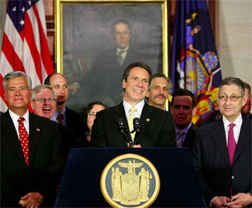
One could be forgiven for thinking that the New York State Legislature was a criminal enterprise. It had its mafioso style assemblyman, Democrat Tony Seminerio, telling a prospective “client” that he would “bury” him unless he paid off.
It had entrepreneurs like Democratic Senator Pedro Espada Jr., who set up a community health operation and, prosecutors say, looted it for millions.
It even had a comical nickel-and-dime guy, Democratic Assemblyman Brian McLaughlin, who sent one of his staffers driving on the New York Thruway with his E-ZPass so that McLaughlin could fake time in Albany and collect per diem payments.
New York State has rules against some of those practices, but rarely were they enforced against legislators who were collecting huge sums of cash from companies that wanted laws passed or state contracts awarded.
Why should they be, when Joseph Bruno, the Republican Senate Majority Leader and No. 3 power in the state, was a master of the trade, convicted of pocketing more than $3 million for peddling influence?
New York law prohibits public officials from accepting payments or having financial ties or other conflicts of interest in connection with their official duties, and bars them from using their positions to extort illegal payments. No gifts over $75 can be accepted, and lawmakers may not tap campaign contributions for personal use. It is a felony for a public servant to defraud the state government.
Legislators must also make annual disclosures to the Legislative Ethics Committee of any outside income of more than $1,000, including “consultant fees.”
But loopholes have abounded. There are no disclosure requirements to the legislature‘s committee on the source of income to consulting shell companies that some legislators have established. Nor have these minimal disclosure records been made readily available to the public.
Even so, 17 legislators have departed because of ethical misconduct or criminal charges since 1999, among them some of the state‘s most powerful politicians. Most of these cases were brought by federal – not state – authorities. In New York, the attorney general does not have authority over the state legislature and state agencies have chosen not to get involved.
The state‘s disinterest in enforcing the law compared to federal authorities was so apparent that Ken Ridett, the state Senate counsel responsible for financial disclosure, once advised Bruno, “Hand deliver your financial disclosure report so you don‘t violate the [federal] mail fraud statute,” recalled David Grandeau, the no-nonsense former executive director of the New York State Lobbying Commission.
New ethics legislation was recently enacted under pressure from Governor Andrew Cuomo, after a parade of legislative crooks filled the headlines. The measure, signed into law last August, sets up a Joint Commission on Public Ethics appointed by the governor and legislative leaders (see sidebar below).
In New York state, legislators are paid $79,500 a year and are deemed part-time officials. The designation allows them to hold outside jobs – ones that often prove very lucrative.
The cast of New York‘s most egregious recent cases highlights the serial failure of state authorities to enforce ethics laws, prompting federal prosecutors to step in.
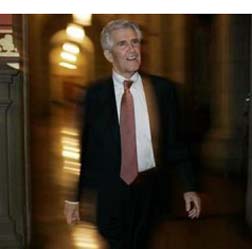
At the top is Republican Joseph L. Bruno, once among New York‘s most powerful legislators. For more than 30 years, Bruno represented a district that included Saratoga, with its famous racetrack, and bordered Albany. His 14 years as Senate Majority Leader gave him power and influence over the state budget, which, a federal indictment suggests, he turned into a cash cow.
Bruno‘s political world began to unravel when a 2005 investigation by Grandeau found that Jared Abbruzzese, an Albany businessman who was seeking control of the New York Racing Authority, was giving Bruno free plane rides. Federal investigators got interested.
A source close to the federal inquiry told 100Reporters, “You would see Abbruzzese was getting stuff from the state. It piques your interest. It‘s a short hop, skip and jump to bank records. You see large amounts of money. [Bruno] was getting $20,000 a month [for ten months] from Abbruzzese.”
In exchange, Bruno funneled hundreds of thousands of dollars in state grants to consulting companies run by Abbruzzese. He collected $1.3 million from Wright Investors‘ Services for getting trade unions to hire Wright as a pension advisor, and another $632,000 from McGinn, Smith & Co., Inc, a brokerage firm also seeking pension business. A billing management company, Asentinel, provided him with $360,000 in commissions for meetings he arranged with state officials.
To handle this cash, Bruno set up a shell company, manned by state employees, that enabled him to evade the Legislative Ethics Committee.
How did Bruno get away with it for so long? Barbara Bartoletti, legislative director for the New York State branch of the League of Women Voters, said some people had suspicions. “He was using his public staff to do his private business,‘‘ said Bartoletti. “Right out of his public office. But it was literally discarded as, ˜That‘s the way business is done here.‘”
Dick Dadey, executive director of the Citizens Union, a nonprofit civic organization, said state ethics rules were of little help.
“The rules were so loosely written that sufficient disclosure was never required of outside business interests,‘‘ said Dadey. “Elected officials like Bruno were able to not fully report.”
Bruno‘s 2009 conviction for corruption was overturned last year based on a 2010 ruling by the U.S. Supreme Court that altered a part of the law used in his prosecution. However, federal prosecutors seeking a second indictment on charges of embezzlement and conspiracy are presenting evidence to a grand jury.
On the other side of the aisle, Democratic Assemblyman Brian McLaughlin of Queens (New York City) took kickbacks and stole from the state through fictitious staff and phony expense accounts. His activities were exposed by an anonymous tip to news agencies in 2004. A federal investigation ensued. Among the revelations in the federal indictment of McLaughlin:
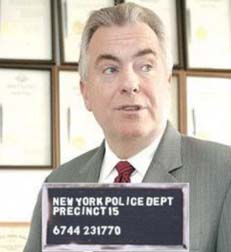
- He claimed non-existent positions on his legislative staff and then collected a portion of the salary;
- He diverted about $55,500 from campaign committees for personal use, and also set up a shell company to hide payments;
- Companies in the traffic signal industry paid him hundreds of thousands of dollars in cash and free work, including $80,000 worth of work on a house in Nissequogue, a beautiful beach town on the north shore of Long Island;
- Another $24,000 went for a country club membership;
- He pocketed state money earmarked for a Little League team.
Perhaps McLaughlin‘s pettiest scam was to get the $139 daily payments legislators received for expenses while in Albany, even when he wasn‘t there. To accomplish this, he had someone else drive to Albany using his E-ZPass to record its movements.
Federal prosecutors say that McLaughlin stole about $2 million from the state and also from a division of Local 3 of the International Brotherhood of Electrical Workers where he was business representative, the highest-ranking official, from 1990 to 2006. He pleaded guilty and is serving ten years in prison.
But before he was locked up, McLaughlin wore a wire for investigators looking into corruption by Democrat Anthony Seminerio, Assemblyman for three decades representing a district in Queens. Seminerio specialized in taking pay-offs from health care companies doing business with the state – his total take was $1 million, according to the federal indictment.
Federal wiretaps recorded more than 15,000 phone conversations, some of which showed that Seminerio could be heavy-handed.
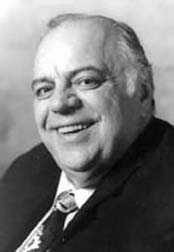
In 1999, he approached the founder of a consulting firm working with health care companies and demanded 50% of the gross receipts. When the man refused, Seminerio contacted his clients to pressure them to cancel contracts. The company went out of business.
That year Seminerio also contacted Robert Richards, president of the Jamaica Chamber of Commerce, to say he would “bury” him unless he became a client. When Richards refused, Seminerio said if he didn‘t hire him, he would “kill” any bill the chamber wanted and that he would pursue any legislator working with Richards and ruin that relationship. Besides, he wouldn‘t be a “gavone” about the fee. (Gavone is “Sopranos”-style slang for ill-mannered and trashy.) Richards ultimately paid about $17,000 over two years.
In 2008, an F.B.I. undercover agent, posing as a prospective client, told Seminerio he wanted to retain him as a consultant. The job: introduce him to legislators so he could argue for privatizing parts of New York‘s probation services. Seminerio arranged a lunch with the chair of the committee that would handle such legislation. He even took the agent onto the Assembly floor and introduced him to the Speaker Pro Tempore as someone “with probation.” The F.B.I. made five $5,000 payments to Marc Consultants.
Seminerio pleaded guilty. Sentenced to six years, he died in prison last year.
Also using a shell company was Nicholas Spano, Republican of Westchester, who served in the Assembly and then the Senate for more than 25 years. He was senior assistant majority leader and chaired the Senate Investigations Committee.
His favorite money-maker was kickbacks from state contracts. Professional Risk Managers, an insurance company with state business, started paying him $1,500 biweekly in 1993 for his efforts to get the company a state insurance contract,, according to the federal indictment. Thanks to his efforts, the Office of General Services gave Professional Risk the plum designation “broker of record,” entitling it to a two-percent commission on all insurance policies written on New York State properties and facilities that the office managed. Spano‘s fee increased to $5,000 a month, and as the contract was extended, to $6,000 a month. By 2002, he was taking in $100,000 a year in bribes from the company.
This scheme was uncovered when an IRS audit that compared Spano‘s tax returns to his senate financial disclosure didn‘t add up. Spano pleaded guilty to tax fraud in February and is expected to be sentenced in June to 12 to 18 months in prison.
One issue to be resolved is whether Spano will be allowed to act as a registered lobbyist – he has a firm called Empire Strategic Plannng – after he leaves prison. Nothing in the state law bars that for someone convicted of a felony.
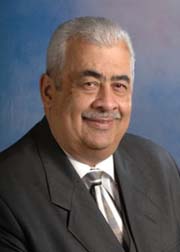
Another popular ploy by dirty legislators is to use nonprofit organizations as a conduit for cash.
Democrat Efrain Gonzalez, a Bronx Senator, favored a nonprofit named Pathways for Youth, Inc., which had received $423,000 from the state and another $4 million from the U.S. Department of Housing and Urban Development.
Pathways made $462,500 in payments to the West Bronx Neighborhood Association, Inc., Inc. , a shell company that paid rent on a luxury apartment Gonzalez kept in the Dominican Republic. West Bronx also paid for a house on the island for his mother-in-law, and membership fees in the DR Coral Vacation Club. There were also payments for logos for his cigar-making company and rent for a home in Monroe, New York, which is not in his district.
Gonzalez pleaded guilty to the federal indictment in 2009 and was sentenced to seven years in prison.
Democratic Senator Pedro Espada Jr. had in 1978, years before his election, set up a network of not-for-profit health care clinics, the Soundview Healthcare Network, in the South Bronx. State and federal complaints say he looted it of millions of dollars – including $14 million in excessive compensation and unwarranted benefits from 2005-2009.
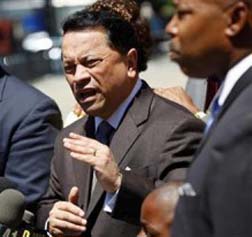
In this case, the New York State Attorney General, which has authority over charities, initiated the investigation and turned over its findings to the Justice Department, which indicted Espada in 2010. The state suit was put on hold pending the criminal case.
According to the complaint, Espada rolled up $450,000 in fake personal expenses, including $100,000 for meals and over $1,000 for flowers. Purloined cash allegedly went to pay $5,000 to a ghostwriter for a book and to make a $49,000 down-payment for $125,000 Bentley.
What is perhaps striking about Espada is his boldness. He didn‘t even live in the poor district that elected him – and where the Soundview nonprofit was located. Instead, he lived in a mansion in Westchester County.
In September, 2010, Espada lost the Democratic primary. The federal criminal indictment came a few months later, and the trial began in New York City last week. In her opening statement March 14, 2012, Assistant U.S. Attorney Carolyn Pokorny said of Espada and his son, Pedro G. Espada, “They have lied, they have cheated, they have stolen and they have betrayed the public‘s trust.”
It‘s a comment prosecutors might make about each of the legislators described above.
New State Ethics Law Tougher, But Doubts on Enforcement Persist
Under New York State‘s new ethics law, state legislators will have to disclose their clients in outside businesses, or those whose interests they represent on legislation. The law also demands they name clients that receive grants or contracts from the state, or which are parties in proceedings before state agencies. Legislators who are attorneys have to disclose more about the clients their firms represent.
“[M]uch of their business in these law firms,” said Barbara Bartoletti, legislative director of the New York State League of Women Voters, “is driven by people who want to get influence in Albany.”
The statements of legislators and other elected officials will be presented online. The financial figures will no longer be redacted.
The new Joint Commission on Public Ethics, whose members will be appointed by both the governor and lawmakers, will randomly audit the 30,000 financial disclosure documents to be filed by all candidates and elected officials, policy-makers and state employees who earn more than $88,000. Audits that result in findings of potential ethics violations be made public. Citizens Union Executive Director Dick Dadey predicted that “the joint oversight and the requirement that random audits be conducted will change the dynamic.”
There remain some problems: Earmarks still exist, though they haven‘t been funded for several years due to budget constraints. There are no legal restrictions on legislators setting up non-profit organizations that can be used to reward political supporters and/or evade campaign finance rules.
Finally, JCOPE must refer its findings to the Legislative Ethics Commission”a body that has proven reluctant to censure errant lawmakers in the past–to decide on penalties. Dadey called that “an area that needs improvement.”
In any event, the Ethics Commission has 90 days to determine a sanction for those civil violations. The JCOPE findings and the Ethics Commission determinations will be made public. And JCOPE will refer breaches of criminal law to law enforcement agencies.
David Grandeau, the former State Lobbying Commission executive director, is concerned that “the 14 members on the board are political appointees who know which way the wind is blowing.” Grandeau knows the dangers of political control of ethics agencies. In order to remove him, Bruno and former Governor Eliot Spitzer abolished his effective commission and folded it into the toothless ethics agency they controlled. Grandeau said, “I thought legislative leaders and the governor should have made an effort to appoint more common citizens.”
That leaves it up to citizen groups viewing the online disclosure reports to provide oversight.
This story is part of a joint project on state integrity with the Center for Public Integrity, Global Integrity and Public Radio International.
Article on 100Reporters site.

